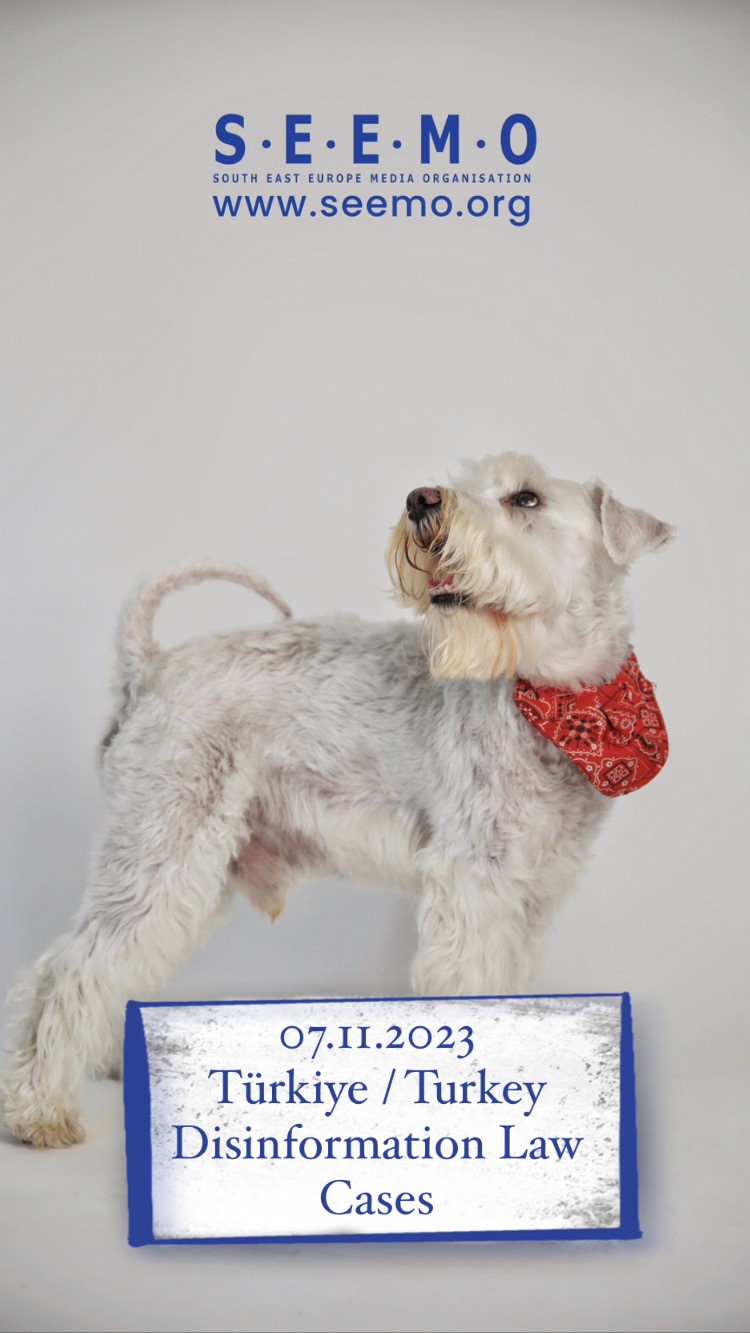Recent arrests of journalists in Türkiye / Turkey, including Tolga Şardan, Cengiz Erdinç and Dinçer Gökçe, have drawn sharp criticism from international community. These detentions have raised concerns about the country’s ongoing crackdown on media freedom.
Tolga Şardan, a columnist for the independent news website T24 (https://t24.com.tr/), was detained on 1 November 2023 charges of spreading false information regarding a report. Tolga Şardan asked, “What is in the ‘judicial report’ submitted by MİT (SEEMO note: MIT – Turkish Intelligence Organization) to the Presidency?” After Şardan’s arrest, police searched his home, and a court in Ankara, Türkiye / Turkey ordered his detention pending trial. He was arrested according to the Article 217/A of the Turkish Penal Code.
Dinçer Gökçe, a reporter at the government critical channel Halk TV (https://halktv.com.tr/), was also detained on 1 November 2023 but later released under judicial control measures.
In another case, journalist Cengiz Erdinç who is contributing for Kısa Dalga (https://kisadalga.net/) was detained on 2 November 2023 for allegedly spreading false information. Also Erdinç was released on condition of judicial control.
These arrests signal an alarming trend in Türkiye / Turkey approach to press freedom. The country’s disinformation law, which introduced prison sentences for spreading false information about security, public order, and public health, has been widely criticized as a tool to stifle journalism and silence dissent.
On 8 November 2023 the country’s Constitutional Court is set to hear a case seeking to annul the disinformation law. The law proposed by President Tayyip Erdogan was adopted by Turkey’s parliament on 13 October 2022. According to the law journalists and social media users could be sent to jail for up to three years for spreading “disinformation”. According to the law social media platforms are responsible liable for the content posted by their users,
The law criminalize people for “publicly disseminating misleading information” . The changes add a clause to Article 217 under the section on “Offences against Public Peace”. The addition of the crime of “disseminate misleading information to the public” is with article 217/A to article 217 of the Turkish Penal Code – connected to Article 29. This is a change of the part of the Turkish Penal Code dated 26/9/2004 and numbered 5237, following article 217.
With no explanation what is ”untrue information”, the law is saying:
“Disseminate misleading information to the public. ARTICLE 217/A
(1) Any person who publicly disseminates untrue information concerning the internal and external security, public order and public health of the country with the sole intention of creating anxiety, fear or panic among the public, and in a manner likely to disturb public peace, shall be sentenced to imprisonment from one year to three years..
(2) If the offence is committed by concealing the true identity of the perpetrator or within the framework of an organisation’s activities, the punishment mentioned above is increased by one-half ”
The South East Europe Media Organisaton (SEEMO) stands in solidarity with Turkish journalists who continue to courageously follow the truth. SEEMO will monitor cases to the disinformation law closely. Press freedom is a fundamental pillar of democracy, and these arrests undermine that foundation. For SEEMO the disinformation law has chilling effect and increased self-censorship.
South East Europe Media Organisation (SEEMO) is a regional non-governmental, non-profit network of editors, media executives and leading journalists in Southeast, South, East and Central Europe. SEEMO members are in Albania, Armenia, Azerbaijan, Belarus, Bosnia-Herzegovina, Bulgaria, Croatia, Cyprus, Czech Republic, Estonia, Georgia, Greece, Hungary, Kazakhstan, Kosovo, Kyrgyzstan, Latvia, Lithuania, Malta, Moldova (with the territory of Transdnestria), Montenegro, North Macedonia, Poland, Romania, Russia, Serbia, Slovakia, Slovenia, Tajikistan, Turkmenistan, Türkiye / Turkey, Ukraine and Uzbekistan. Austria, Italy, Vatican and San Marino have a special status in SEEMO. SEEMO has over 3000 individual members, and additional media as corporate members.
#fyp #mediafreedom #seemo #freespeech #southeasteuropemediaorganisation #ngo #journalist #journalistunderattack #turkey #TolgaŞardan #DincerGokce #CengizErdinc #journalistarrested #journalistdetained #jailedjournalist #journalistinjail #SEEMO #pressfreedom #mediafreedom #freemedia @sardan_tolga @DinerGke @cengizerdinc

